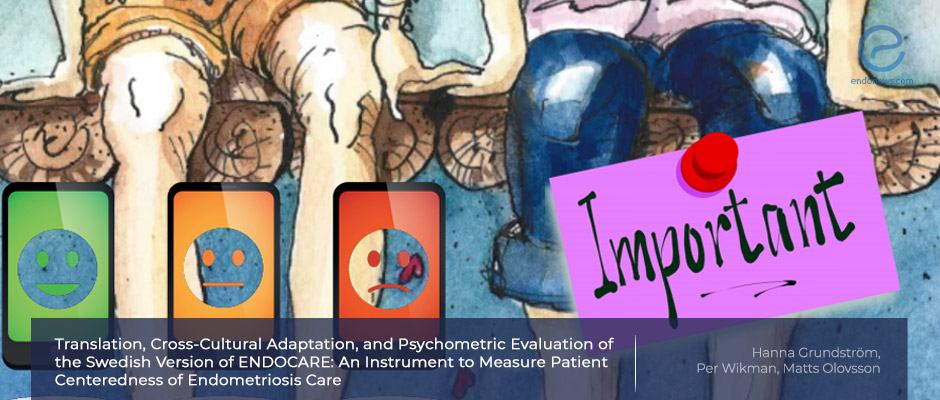Patient- centeredness in endometriosis
Jul 5, 2021
The Swedish version of ENDOCARE to measure the negative experience of care and mean personal importance.
Key Points
Highlights:
- Many academic centers are recently interested in endometriosis patient-centered methods to understand the severity of endometriosis and treatment outcomes from patients’ point of view.
Importance:
- The present study aimed to evaluate the validity and reliability of the ENDOCARE Questionnaire translated into Swedish.
What's done here:
- The ENDOCARE questionnaire was sent by e-mail to randomly selected 500 endometriosis patients with laparoscopically confirmed endometriosis.
- The aims of this study were:
- To translate and culturally adapt ENDOCARE Questionnaire into Swedish,
- To evaluate its validity, and
- To measure the reliability.
Key Results:
- 206 (41%) patients answered the ENDOCARE questionnaire, and 187 (37%) were native Swedish speakers.
- The duration between first endometriosis symptoms and diagnosis was 8.4 years, and 40% received a second opinion for endometriosis.
- The patient-centeredness score is calculated based on the percentage of negative experience of care and mean personal importance.
- The highest patient-centeredness was found in the "endometriosis clinic staff"dimension.
- The lowest patient-centeredness was in the dimentions of "emotional support", alleviation of fear", "anxiety" and the "involvement of significant others".
- The test-rest analysis reliability was acceptable.
Limitations:
- The relatively low participation rate and the risk of recall bias were the limitations.
- It is likely that women gave their answers based on their most recent experiences.
- This is a survey study that could be affected by the duration of endometriosis symptoms, the patient's psychological condition, and external factors.
Lay Summary
Endometriosis is common in fertile age, and women with endometriosis are suffering from serious symptoms including pelvic discomfort, dysmenorrhea, and infertility.
Due to resemblances of endometriosis symptoms with other diseases, most endometriosis patients are faced with delays in diagnosis. To solve these problems, patient-centered modality is accepted and questionnaires were formed to understand endometriosis better.
The ENDOCARE questionnaire was previously described and validated to understand endometriosis patients’ characteristics, but the Swedish version of it has not been validated yet.
Grundström and colleagues translated the ENDOCARE questionnaire from English to Swedish, and tthen it was sent to 500 endometriosis patients previously diagnosed by laparoscopic surgery. The patient-centeredness score is calculated based on the percentage of negative experience of care and mean personal importance.
Total 187 patients with a mean age of 37.2 years were enrolled in the study, 104 patients had one or more children. The questionnaire completeness was high, 97% and 91%, respectively. The highest patient-centeredness was found in the "endometriosis clinic staff"dimension. The lowest patient-centeredness was in the dimentions of "emotional support", alleviation of fear", "anxiety" and the "involvement of significant others".
The internal consistency test revealed that the percentage of negative experiences, mean important scores and patient-centeredness scores were acceptable.
The present study demonstrated that the Swedish version of the ECQ is a valid, acceptable, and usable questionnaire in understanding patients’ perspectives about endometriosis and endometriosis treatment. This study was published in the May 2021 issue of the journal "Gynecologic and Obstetric Investigation".
Research Source: https://pubmed.ncbi.nlm.nih.gov/33940582/
ENDOCARE questionnaire endometriosis patient-centeredness emotional support fear anxiety significant-others

